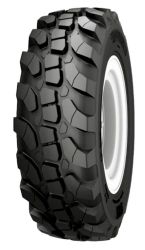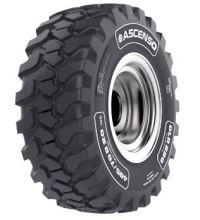RADIAL Construction Tires
-
 Availability: 4More Info...More InformationAdditional InfoRIM NOT INCLUDEDBearing-Bolt Pattern-Box Quantity-BrandALLIANCECenter Bore in/mm-ConstructionRADIALCountry of OriginISRAELDiameter335Finish-Hub Length-Industry CodeE2Load Index147Load/Speed Index147A8Machine Fitment/Application-Max Load Capacity (Lbs)6770Max PSI-Mounted Diameter (Inch)41.1Pattern/Position-Ply/Load Index/Star Rating147A8Ratio80Rim Diameter20Rim Size-Rim Width-Rolling Circumference-Section Width13.8Size335/80R-20Speed Rating/Speed (MPH)A8/25Static Loaded Radius (inch)-StyleCM-S-608Surface / Terrain-Tread Depth (32nds)23/32Tread Width-Tube Type / TubelessTUBELESSTypeE2Valve-Weight (Lbs.)134.000000Wheel Back Spacing in/mm-Wheel Front Spacing in/mm-Wheel Offset in/mm-
Availability: 4More Info...More InformationAdditional InfoRIM NOT INCLUDEDBearing-Bolt Pattern-Box Quantity-BrandALLIANCECenter Bore in/mm-ConstructionRADIALCountry of OriginISRAELDiameter335Finish-Hub Length-Industry CodeE2Load Index147Load/Speed Index147A8Machine Fitment/Application-Max Load Capacity (Lbs)6770Max PSI-Mounted Diameter (Inch)41.1Pattern/Position-Ply/Load Index/Star Rating147A8Ratio80Rim Diameter20Rim Size-Rim Width-Rolling Circumference-Section Width13.8Size335/80R-20Speed Rating/Speed (MPH)A8/25Static Loaded Radius (inch)-StyleCM-S-608Surface / Terrain-Tread Depth (32nds)23/32Tread Width-Tube Type / TubelessTUBELESSTypeE2Valve-Weight (Lbs.)134.000000Wheel Back Spacing in/mm-Wheel Front Spacing in/mm-Wheel Offset in/mm- -
 Availability: 5More Info...More InformationAdditional InfoRIM NOT INCLUDEDBearing-Bolt Pattern-Box Quantity-BrandALLIANCECenter Bore in/mm-ConstructionRADIALCountry of OriginINDIADiameter400Finish-Hub Length-Industry CodeR4Load Index147Load/Speed Index147BMachine Fitment/Application-Max Load Capacity (Lbs)6770Max PSI-Mounted Diameter (Inch)40Pattern/Position-Ply/Load Index/Star Rating147BRatio70Rim Diameter18Rim Size-Rim Width-Rolling Circumference-Section Width15.9Size400/70R-18Speed Rating/Speed (MPH)B/30Static Loaded Radius (inch)-StyleALLIANCE 585Surface / Terrain-Tread Depth (32nds)38/32Tread Width-Tube Type / TubelessTUBELESSTypeR4Valve-Weight (Lbs.)150.000000Wheel Back Spacing in/mm-Wheel Front Spacing in/mm-Wheel Offset in/mm-
Availability: 5More Info...More InformationAdditional InfoRIM NOT INCLUDEDBearing-Bolt Pattern-Box Quantity-BrandALLIANCECenter Bore in/mm-ConstructionRADIALCountry of OriginINDIADiameter400Finish-Hub Length-Industry CodeR4Load Index147Load/Speed Index147BMachine Fitment/Application-Max Load Capacity (Lbs)6770Max PSI-Mounted Diameter (Inch)40Pattern/Position-Ply/Load Index/Star Rating147BRatio70Rim Diameter18Rim Size-Rim Width-Rolling Circumference-Section Width15.9Size400/70R-18Speed Rating/Speed (MPH)B/30Static Loaded Radius (inch)-StyleALLIANCE 585Surface / Terrain-Tread Depth (32nds)38/32Tread Width-Tube Type / TubelessTUBELESSTypeR4Valve-Weight (Lbs.)150.000000Wheel Back Spacing in/mm-Wheel Front Spacing in/mm-Wheel Offset in/mm- -
 Availability: 19More Info...More InformationAdditional InfoRIM NOT INCLUDEDBearing-Bolt Pattern-Box Quantity-BrandASCENSOCenter Bore in/mm-ConstructionRADIALCountry of Origin-Diameter335Finish-Hub Length-Industry Code-Load Index147Load/Speed Index147A2Machine Fitment/ApplicationTELEHANDLER, COMPACT LOADERMax Load Capacity (Lbs)6770Max PSI54Mounted Diameter (Inch)41.1Pattern/PositionNON DIRECTIONALPly/Load Index/Star Rating147A2Ratio80Rim Diameter20Rim Size20X11Rim Width11Rolling Circumference123.4Section Width13.3Size335/80R-20Speed Rating/Speed (MPH)A2/5Static Loaded Radius (inch)18.7StyleCLR 280Surface / Terrain-Tread Depth (32nds)-Tread Width-Tube Type / TubelessTUBELESSTypeNON DIRECTIONALValve-Weight (Lbs.)140.000000Wheel Back Spacing in/mm-Wheel Front Spacing in/mm-Wheel Offset in/mm-
Availability: 19More Info...More InformationAdditional InfoRIM NOT INCLUDEDBearing-Bolt Pattern-Box Quantity-BrandASCENSOCenter Bore in/mm-ConstructionRADIALCountry of Origin-Diameter335Finish-Hub Length-Industry Code-Load Index147Load/Speed Index147A2Machine Fitment/ApplicationTELEHANDLER, COMPACT LOADERMax Load Capacity (Lbs)6770Max PSI54Mounted Diameter (Inch)41.1Pattern/PositionNON DIRECTIONALPly/Load Index/Star Rating147A2Ratio80Rim Diameter20Rim Size20X11Rim Width11Rolling Circumference123.4Section Width13.3Size335/80R-20Speed Rating/Speed (MPH)A2/5Static Loaded Radius (inch)18.7StyleCLR 280Surface / Terrain-Tread Depth (32nds)-Tread Width-Tube Type / TubelessTUBELESSTypeNON DIRECTIONALValve-Weight (Lbs.)140.000000Wheel Back Spacing in/mm-Wheel Front Spacing in/mm-Wheel Offset in/mm-
What Are Radial Construction Tires?
Radial construction tires represent a tire technology designed for construction vehicles and equipment that features a specific construction method different from traditional bias-ply tires. In radial tires, the cord plies are arranged at a 90-degree angle to the direction of travel, creating a more flexible sidewall with a stable tread area. This design was first patented in 1946 by Michelin and has since become the standard for most passenger and commercial vehicles, including construction equipment, due to the numerous advantages they offer.
Radial tires are particularly valued in the construction industry for their durability, ride comfort, improved fuel efficiency, and reduced ground compaction. The separate sidewall and tread functions allow for better shock absorption and tire longevity, which are critical factors in the rough and varied conditions of construction sites.
Designs and Features of Radial Construction Tires
Radial construction tires are built with features that make them well-suited to the demands of construction environments:
- Flexible Sidewalls: The radial design allows the sidewalls to flex more, absorbing impacts from rough terrain, which can lead to a smoother ride for the operator and less wear on the vehicle's suspension.
- Steel Belts: Most radial tires include steel belts beneath the tread surface, which provide added strength, stability, and puncture resistance. This is especially important in preventing downtime due to tire damage on construction sites.
- Tread Design: The tread on radial tires is designed to maintain consistent contact with the ground, providing better traction and a more even wear pattern over time. This can result in longer tread life compared to bias-ply tires.
- Heat Dissipation: Radial tires typically run cooler than bias tires at higher speeds due to their construction and materials, reducing the risk of blowouts or premature wear.
- Fuel Efficiency: The reduced rolling resistance of radial tires can contribute to better fuel economy for construction equipment, which is an important factor given the high cost of fuel.
- Load Carrying Capability: Radial tires are designed to carry heavier loads at higher speeds while maintaining their shape, which maximizes the equipment's carrying capacity without compromising safety or performance.
Applications and Uses of Radial Construction Tires
Radial construction tires are utilized across a wide range of construction equipment due to their performance benefits:
- Loaders and Excavators: These machines benefit from the improved stability and traction provided by radial tires, especially when maneuvering heavy loads or operating on uneven surfaces.
- Graders and Dump Trucks: The longer tread life and better fuel efficiency of radial tires make them ideal for graders and trucks that cover more distance on construction sites.
- Cranes and Telehandlers: The high load capacity and stable handling of radial tires enhance the safety and efficiency of lifting operations performed by cranes and telehandlers.
- Paving Equipment: For pavers, consistent ground contact is crucial for laying smooth surfaces, making radial tires a preferred choice for these machines.
- Backhoes and Skid Steer Loaders: These versatile machines benefit from the all-around improvements in performance that radial tires provide, from traction to operator comfort.
- Articulated Haulers: Radial tires are essential for these vehicles due to their need for durability, stability, and efficiency when transporting heavy materials over varied terrain.
The use of radial construction tires reflects a focus on efficiency, safety, and cost-effectiveness in construction operations. By offering enhanced performance characteristics that are aligned with the needs of modern construction equipment, radial tires support the industry's move towards more productive and sustainable practices. Their adaptability and resilience in tough working conditions mean that they play a critical role in minimizing downtime and maximizing the productivity of construction machinery.
